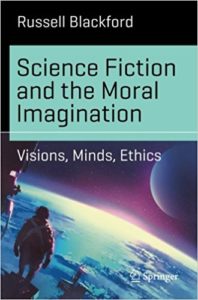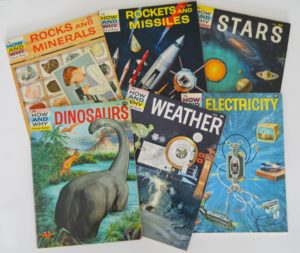 Those of you who know me a bit (or have just checked out my LibraryThing page) are well aware of my love for the genre of science fiction. I’ve been a huge fan for as far back as I can remember, and a majority of my non-fiction falls into either that or the broad fantasy realm. As such, when I saw that my friend and former Skeptic Ink Network colleague Russell Blackford had a new book coming out titled Science Fiction and the Moral Imagination: Visions, Minds, Ethics, I knew we were all in for a treat.
Those of you who know me a bit (or have just checked out my LibraryThing page) are well aware of my love for the genre of science fiction. I’ve been a huge fan for as far back as I can remember, and a majority of my non-fiction falls into either that or the broad fantasy realm. As such, when I saw that my friend and former Skeptic Ink Network colleague Russell Blackford had a new book coming out titled Science Fiction and the Moral Imagination: Visions, Minds, Ethics, I knew we were all in for a treat.
In case you aren’t already familiar with Russell, he’s an award-winning Australian philosopher, legal scholar, and literary critic who is based in Newcastle, NSW. A prolific author, he’s also a Fellow of the Institute for Ethics and Emerging Technologies, editor-in-chief of The Journal of Evolution and Technology, a regular op-ed columnist with Free Inquiry, and a Laureate of the International Academy of Humanism.
After reading Science Fiction and the Moral Imagination, I asked Russell if he’d be interested in submitting himself to a bit of an interview on some of the topics touched upon by the book, as well as about himself and his writings generally. He graciously agreed, so below is part 1 of our interview. Part 2 should be up in a few days. My questions are bolded, with Russell’s replies directly underneath.
Which came first, your interest in science fiction or philosophy? How has your love of one influenced your love of the other?
Technically, my interest in science fiction came first: it dates back to primary school, whereas my formal interest in philosophy dates back only as far as high school – and it blossomed when I went to university. Still, my interest in science – and in the general picture of the world revealed through rational inquiry – goes back even further than my interest in science fiction.
 From almost as soon as I could read, I was delighted by the expositions of science and history in children’s encyclopedias and in popular book series aimed at kids, such as the How and Why Wonder Books that were much loved in the 1960s. As a young child, I was quite sickly – long, irrelevant story here – and often confined to bed. I responded, in part, by immersing myself in the world of books. My love of books has remained with me, and sustained me, all my life. But for whatever reason, I initially took less to fiction aimed at my age group than to books that could tell me about the actual world, about the entire space-time world that was so vastly larger than anything in my experience as a working-class boy growing up in an industrial city in Australia.
From almost as soon as I could read, I was delighted by the expositions of science and history in children’s encyclopedias and in popular book series aimed at kids, such as the How and Why Wonder Books that were much loved in the 1960s. As a young child, I was quite sickly – long, irrelevant story here – and often confined to bed. I responded, in part, by immersing myself in the world of books. My love of books has remained with me, and sustained me, all my life. But for whatever reason, I initially took less to fiction aimed at my age group than to books that could tell me about the actual world, about the entire space-time world that was so vastly larger than anything in my experience as a working-class boy growing up in an industrial city in Australia.
When I did start to read more fiction during my later years of primary school, I turned, in particular, to science fiction. Soon I was reading everything I could find that fell into the SF genre. By the age of 10 or 11, I’d already moved on from SF aimed specifically at children to the work of Isaac Asimov, Robert A. Heinlein (I read the “Heinlein juveniles,” of course, but also everything else by Heinlein that was available to me in local libraries and bookshops), Arthur C. Clarke, Ray Bradbury, Alfred Bester, Brian Aldisss, and many others.
(Soon I was also reading stories, by the likes of Michael Moorcock, about magical fantasy worlds. Somewhere around there, I also developed a fascination with superhero comics, but that’s a whole other story.)
I don’t think that the love that I developed for SF led to my love of philosophy, but, anyway, what bright kid hasn’t become something of a budding philosopher, however naive, by the age of 10 or so? Who, reading this, didn’t spend time, as a child, wondering about the classic Big Questions, such as those about the existence of a god or gods, about whether we have free will in some sense, or are subject to fate, whether we survive our deaths, how we should live our lives, and how we should best plan human societies?
I doubted the answers to these sorts of questions offered by religion, and those doubts continued during my teenage years, even when I became deeply involved for a time in Evangelical Christianity. It seemed to me natural to approach the Big Questions in the light of my (obviously very limited) scientific understanding of the world, and to look for how far reason and inquiry could take us in answering them.
In short, I’m no scientist, but I’ve always found the expanding and deepening scientific picture of the world a source of fascination, and this influenced not only my taste in literature – hence science fiction – but also my approach to philosophy. My love of science fiction and my continued willingness to take the Big Questions seriously seem to me to have come from a deeper source in how I’m inclined to try to understand the world. That is, I’m inclined to skeptical doubt, to logical analysis, and to efforts at intellectual clarity. I’ve always found myself slightly alienated by traditional, yet poorly defended, answers, and I’m inclined to yearn for a unity of knowledge, to try to grasp how it all fits together.
With all that said about my own psychological quirks, there are well-known synergies between science fiction and philosophy, and it’s common for philosophers to be avid SF readers as well as employing their own science-fictional thought experiments.
I should now add that everything I’ve said to this point is a simplification. For a start, many other influences have fed into the way I think about philosophical questions. Also, much as I do, indeed, love science fiction, I have a love of mythology, poetry, drama, and literary fiction that extends my tastes in narrative well beyond SF.
What compelled you to write this book? What do you hope people reading it take away?
To be honest, I wrote it because I was approached by a major academic publisher, Springer. They inquired whether I might be interested in pitching a proposal for their “Science and Fiction” series of books, which is really a series of monographs about science and science fiction. There’s a long story about what I had written and edited previously, etc., that might have made me an obvious person for a publisher to contact about something like this. But I won’t go into that here; it’s not very relevant, and there’s a whole checkered life history involved.
After some useful – by which I really mean clarificatory – correspondence went back and forth, I was able to work up a formal proposal quite quickly. It seemed obvious that there was, at the very least, much that I could say about philosophy and science fiction, if not more exactly about science and science fiction. And from there it took little more thought to realize that, if I explored the SF genre in some detail from the viewpoint of a philosopher, I’d soon find myself discussing the historical rise of science and how it made the genre possible and shaped its themes. I was also delighted to have an excuse to fill gaps in my reading and viewing, and to re-read many favorite novels and stories that I hadn’t broached for years.
 Most of my philosophical work is in moral, legal, and political philosophy. I soon found myself thinking about the ways in which questions from moral philosophy can be connected to many of SF’s popular icons, themes, and narrative tropes: for instance, to stories about aliens, mutants, robots, and Artificial Intelligence, or about adventures in vast space and deep time. Among other things, it was clear that I had much to say about what I refer to in Science Fiction and the Moral Imagination as science fiction’s Intelligent Others: non-human, but rational, beings of various kinds. I was asking – not for the first time, but now with some intensity – what these imaginary beings signify when they appear in SF narratives. How are they used to engage with moral questions? How has our collective imagination of these Intelligent Others been shaped by scientific knowledge and understanding, and how would we regard extraterrestrial aliens or cognitively superior mutants, for example, if they actually existed and we encountered them?
Most of my philosophical work is in moral, legal, and political philosophy. I soon found myself thinking about the ways in which questions from moral philosophy can be connected to many of SF’s popular icons, themes, and narrative tropes: for instance, to stories about aliens, mutants, robots, and Artificial Intelligence, or about adventures in vast space and deep time. Among other things, it was clear that I had much to say about what I refer to in Science Fiction and the Moral Imagination as science fiction’s Intelligent Others: non-human, but rational, beings of various kinds. I was asking – not for the first time, but now with some intensity – what these imaginary beings signify when they appear in SF narratives. How are they used to engage with moral questions? How has our collective imagination of these Intelligent Others been shaped by scientific knowledge and understanding, and how would we regard extraterrestrial aliens or cognitively superior mutants, for example, if they actually existed and we encountered them?
Moving on, you asked what I hope to have offered my readers. First, I’ve offered a book that should be accessible to bright teenagers, and will definitely be accessible to undergraduate college students. It is aimed at a wide audience. When I write a book like this, I hope to establish some points that genuinely add to our understanding, so that even experts might take an interest and perhaps benefit. I’m trying to make some intellectual progress. But I don’t write in a way that is accessible only to experts. I hope that Science Fiction and the Moral Imagination can hold the attention of almost anybody who is interested in its set of topics.
Second, it is not the sort of book that uses science fiction narratives as a springboard to explain philosophical ideas. To be clear, I do introduce whatever philosophical ideas I think are needed, and I hope I’ve done so in a way that is accurate, accessible, and absorbing. However, I’m interested in science fiction for its own sake, not as a pedagogical device. I’m more interested in examining the cultural phenomenon of science fiction from the viewpoint of a philosopher than in using SF stories to sugarcoat and introduce philosophy. To a large extent, then, the book can be seen as an exercise in the philosophy of science fiction, though in truth there is also much discussion of the philosophical ideas found in science fiction.
I hope that a reader with an interest in the genre will obtain a deeper and clearer understanding of how science fiction works. I hope that even those people with much greater SF erudition than I possess – such people do exist! – will discover that I’ve formulated some ideas which seem familiar, but in ways that they hadn’t consciously put into their own words. I hope they’ll be able to make some new connections among the imaginative novels, stories, movies, and so on, that they’re familiar with. If luck goes my way, some SF scholars and fans might even start using terminology that I’ve brought to the discusion, such as “the ethic of destiny” and “Intelligent Others.”
One last point is relevant here. I’m often critical of various approaches to discussing literature and popular narratives. In Science Fiction and the Moral Imagination, I examine many SF novels, stories, and movies (and even a few TV shows and plays), and I hope I’ve at least provided one useful model of how it can be done. With luck, I’ve approached the texts under discussion in a way that is accessible and fair, as informed, complex, and nuanced as required, and perhaps occasionally insightful. If I’ve managed to achieve that even part of the time, I’ve made a cultural contribution.
Check back soon for Part 2 of the interview, where we talk about specific book recommendations and approaches to writing fiction versus non-fiction.
